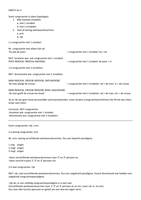Summary
Summary AQA Psychology: obedience: legitimacy of authority
This document provides detailed A01 notes and A03 evaluation into legitimacy of authority of the social influence module, these notes are clear, and easy to follow. The A03 contains a deep explanation of both strengths and limitations to the theory/study, along with evidential support or criticis...
[Show more]






